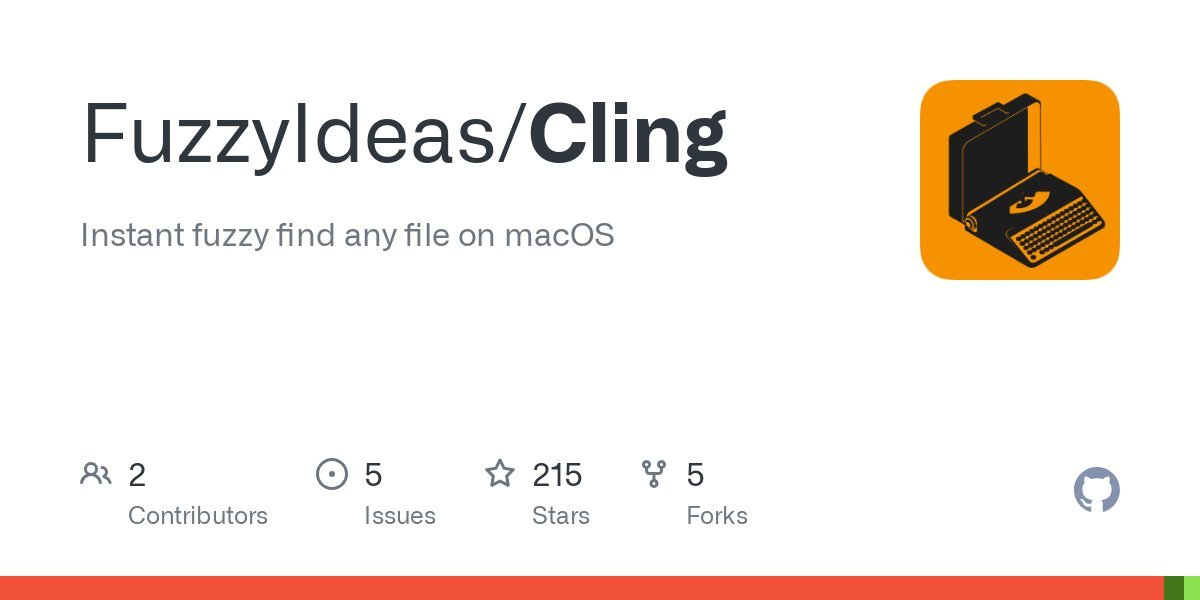Cling revolutionizes macOS file discovery with near-instant fuzzy search powered by fd/fzf, enabling lightning-fast file actions without mouse dependency. This open-source tool targets power users frustrated with Spotlight's limitations by indexing hidden files and external volumes. We examine its unique position in the macOS ecosystem and performance trade-offs.

For macOS power users, file search has long meant choosing between Spotlight's speed limitations or complex query builders in advanced tools. Enter Cling—an open-source application that reimagines file discovery by delivering Everything-like instant results with fuzzy matching and rapid-action capabilities.
Lightning in a Bottle: How Cling Works
At its core, Cling leverages Rust's fd and fzf to build an in-memory filesystem index, enabling sub-second fuzzy searches across your entire machine—including hidden files, dotfiles, and system directories that Spotlight ignores. Unlike traditional search utilities, Cling prioritizes actionability:
- Press
⌘+Oto open files in default apps ⌘+Yfor QuickLook previews⌘+⇧+Cto copy paths- Custom shortcuts for tools like Yoink or Pixelmator
{{IMAGE:3}} Cling's interface enables keyboard-driven file actions (Source: FuzzyIdeas/Cling)
Crucially, Cling supports .fsignore (gitignore-style patterns) to exclude unnecessary directories, and automatically indexes external drives and network shares. As the developers note:
"Cling is for quickly finding one or more specific files by roughly knowing the name, and then doing something with the file immediately" – Cling Documentation
The macOS Search Landscape: Where Cling Fits
Cling carves a distinct niche between two tool categories:
| Tool Type | Examples | Cling's Differentiation |
|---|---|---|
| Launchers | Spotlight, Alfred, Raycast | Searches system/hidden files; true fuzzy matching |
| Advanced File Finders | HoudahSpot, EasyFind | Prioritizes instant action over complex query syntax |
While tools like ProFind excel at metadata-rich queries, Cling focuses on the "90% use case": locating known files by approximate name and acting on them instantly—ideal for developers needing to grab a config file or asset quickly.
Performance Trade-Offs: The Cost of Speed
Instant results demand resources. Cling's in-memory index consumes 300MB–2GB RAM, scaling with file counts. During initial indexing (1-5 minutes), CPU usage spikes significantly, with periodic re-indexing every 72 hours. Searches trigger short 1-5 second CPU bursts:
Memory: Index kept in RAM (swappable when app backgrounded)
CPU: Bursty usage during typing pauses
Battery: Minimal impact during idle; proportional to search frequency
Developers should note this prioritizes responsiveness over frugality—a conscious design choice for the target audience.
The Verdict: A Power User's Accelerator
Cling isn't for casual users. Its value shines for engineers juggling projects across multiple volumes who need to rapidly locate and act on files without context-switching. By combining UNIX tooling with macOS-native workflows, it fills a critical gap for those who've longed for Everything's magic on macOS. As file systems grow increasingly complex, tools like Cling that optimize for action over discovery represent the next evolution of developer productivity.

Comments
Please log in or register to join the discussion